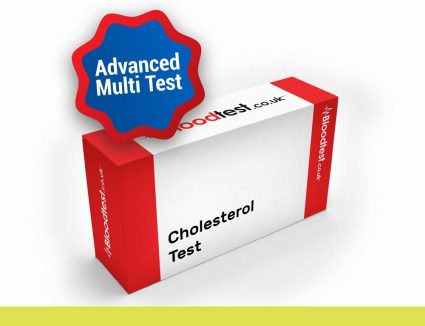Enhancing Your Heart Health: The Critical Significance of Regular Cholesterol Testing
Understanding the Vital Role of Cholesterol Monitoring for Your Overall Health

To achieve and maintain optimal heart health, it is essential to consistently monitor your cholesterol levels. Elevated levels of LDL (low-density lipoprotein), commonly known as ‘bad' cholesterol, can lead to the formation of dangerous plaques within your arteries. This harmful accumulation significantly elevates the risk of developing severe conditions such as heart disease and experiencing a stroke. In contrast, HDL (high-density lipoprotein), often referred to as ‘good' cholesterol, plays a crucial role in removing LDL cholesterol from the bloodstream, thereby fostering cardiovascular wellness. Regular cholesterol blood tests empower individuals to effectively track these critical markers and take proactive measures to protect their health. Residents of Bexhill-on-Sea can take charge of their health by understanding the balance between these types of cholesterol, facilitating informed decisions regarding their lifestyle and healthcare strategies.
For individuals residing in Bexhill-on-Sea, undergoing cholesterol testing transcends the mere act of checking health; it serves as an enlightening experience that can catalyse essential lifestyle adjustments. Engaging closely with local healthcare professionals to interpret and discuss test results fosters a comprehensive approach to health management. Regular testing should not be perceived merely as a routine obligation; rather, it establishes a foundation for improved well-being and nurtures a proactive mindset towards health management, empowering individuals to take ownership of their cardiovascular health.
Prefer Audio Resources? Discover Our Informative Cholesterol Testing Guide!
 Determining the Ideal Frequency for Cholesterol Testing
Determining the Ideal Frequency for Cholesterol Testing
Establishing the optimal frequency for cholesterol assessments is crucial in maintaining excellent cardiovascular health. In the UK, health guidelines recommend that adults aged 40 and above should undergo a cholesterol check every four to six years. However, individuals presenting specific risk factors—such as a family history of heart disease, obesity, or pre-existing conditions like diabetes—may necessitate more frequent evaluations. Residents of Bexhill-on-Sea are encouraged to engage in discussions with their GP to devise a personalised testing schedule tailored to their unique health requirements and circumstances.
Healthcare professionals stress the significance of early detection in effectively managing health. Regular screenings can unveil potential health issues prior to their progression into more severe conditions. By availing themselves of the health services present in Bexhill-on-Sea, residents can maintain vigilance regarding their heart health and proactively implement measures to mitigate risks associated with elevated cholesterol levels, ensuring a healthier future.
Understanding Your Cholesterol Test Results for Empowered Health Choices
Deciphering your cholesterol test results may initially seem daunting, yet it is imperative for making informed health decisions. Cholesterol levels are typically reported in milligrams per decilitre (mg/dL) of blood and categorised into several key groups: total cholesterol, LDL, HDL, and triglycerides. A total cholesterol level of below 200 mg/dL is generally regarded as desirable, whilst levels exceeding 240 mg/dL may signify an increased risk of heart disease and should be addressed promptly.
In Bexhill-on-Sea, discussing your results with a healthcare professional is vital; they can elucidate what these figures signify for your heart health. Medical experts can provide tailored advice on interpreting your cholesterol levels in the context of your overall health history, lifestyle choices, and family genetics, empowering you to take necessary actions. Understanding your results serves as a foundational step towards achieving a healthier life.
Finding Trustworthy Cholesterol Testing Services in Bexhill-on-Sea

Accessing Cholesterol Testing Services Through Local General Practices
In Bexhill-on-Sea, numerous GP surgeries have incorporated cholesterol testing into their regular health evaluations, providing accessible opportunities for residents eager to monitor their cholesterol levels in a familiar healthcare setting. These local GP practices typically offer this vital test during annual check-ups, enabling individuals to adopt a proactive approach to their heart health without the need for separate appointments.
The advantages of utilising local GP services extend beyond mere convenience; fostering a rapport with your healthcare provider allows for tailored advice and continuous support based on your individual health needs. If you are uncertain about the availability of this service, do not hesitate to contact your GP surgery in Bexhill-on-Sea for further information. Early intervention can profoundly impact your health, underscoring the importance of leveraging local resources for your well-being.
Exploring Private Clinics for Efficient Cholesterol Testing Solutions
Private clinics in Bexhill-on-Sea offer prompt cholesterol testing services for individuals seeking more flexible and expedited options. These clinics often implement a no-waiting policy, allowing you to arrange your test at your convenience. With a growing focus on health optimisation, many individuals view private healthcare as an opportunity to take charge of their health without the restrictions imposed by NHS waiting lists, thereby enhancing their health journey.
Visiting a private clinic can also enrich your overall experience, as the staff are typically trained to provide personalised advice based on your results and lifestyle. Additionally, these clinics may offer supplementary health screenings, providing you with a comprehensive overview of your health status in one visit. Consequently, opting for a private clinic can be a worthwhile investment in your health journey and overall well-being.
Utilising Mobile Health Services for Convenient Cholesterol Testing Options

Innovative mobile health services have emerged in Bexhill-on-Sea, enhancing the accessibility of cholesterol testing for the community. These mobile units travel to various locations across town, delivering healthcare services directly to residents. Whether stationed in local parks, community centres, or bustling market days, these services aim to connect with individuals who may overlook regular health assessments, ensuring they receive the care they need.
The convenience afforded by mobile health services allows residents to receive testing without the necessity of travelling to a clinic or GP office. Often, these units provide results on-site or within a short timeframe, enabling you to take immediate action based on your cholesterol levels. By embracing these modern health solutions, residents of Bexhill-on-Sea can proactively manage their cardiovascular health and stay informed about their well-being.
Preparing Effectively for Your Cholesterol Test
Understanding Fasting Requirements for Accurate Cholesterol Testing
Preparing for a cholesterol blood test typically necessitates fasting for 9 to 12 hours before the procedure. This fasting period is critical for ensuring the accurate measurement of your lipid profile, as it provides a clearer reflection of your LDL and HDL cholesterol levels without interference from recently consumed foods. For residents of Bexhill-on-Sea, scheduling your test in the morning can simplify the fasting process, allowing for an overnight fast that is easy to manage.
Throughout the fasting period, it is vital to remain hydrated by drinking water. However, it is advisable to avoid other beverages, including coffee or tea, as these can potentially affect test results. Proper preparation can lead to more accurate outcomes, equipping you and your healthcare provider with the necessary information for making well-informed health decisions based on your cholesterol levels.
What to Expect During Your Cholesterol Testing Experience
Undergoing a cholesterol blood test is generally a straightforward procedure that typically takes only a few minutes. The process involves a simple blood draw, usually taken from the arm, performed by a qualified healthcare professional. In Bexhill-on-Sea, you can anticipate a clean and comfortable environment where the staff prioritise your comfort and overall well-being, ensuring a positive testing experience.
You may feel a quick pinch as the needle is inserted during the test, but this sensation is usually brief and well-tolerated by most individuals. Following blood collection, a small bandage will be applied to the site to prevent any minor bleeding. Most individuals can swiftly return to their normal activities immediately after the test; however, it is wise to adhere to any specific instructions your healthcare provider may give. Being well-informed and prepared while awaiting your results is essential for a smooth experience.
Post-Test Care and Recommended Next Steps
After completing your cholesterol blood test, it is important to resume your regular activities, although your healthcare provider may offer some recommendations to consider for optimal recovery. Some individuals may experience minor bruising or tenderness at the site of the blood draw, but this typically resolves within a few days. Should you notice anything unusual or have questions regarding your recovery, do not hesitate to reach out to your healthcare provider for clarification and guidance.
In Bexhill-on-Sea, the post-test process involves awaiting and discussing your results with your GP. Understanding what your cholesterol levels indicate about your overall health is crucial for effective health management. This follow-up consultation provides an invaluable opportunity to explore necessary lifestyle adjustments or medical interventions based on your results, ensuring that you are equipped to enhance your heart health.
Deciphering Your Cholesterol Test Results for Improved Health Outcomes
Understanding Healthy Cholesterol Levels for Optimal Heart Health
Grasping what constitutes healthy cholesterol levels is essential for maintaining robust heart health. In the UK, total cholesterol levels are categorised as follows: a reading of less than 5.0 mmol/L is deemed healthy, whilst levels between 5.0 and 6.0 mmol/L are considered borderline high; readings exceeding 6.0 mmol/L signal high cholesterol, which may necessitate prompt attention from a healthcare provider to mitigate risks.
For those residing in Bexhill-on-Sea, consulting the guidelines provided by the British Heart Foundation regarding specific recommendations based on age, sex, and health history can be immensely beneficial. Understanding these figures empowers individuals to take control of their health. If your results fall outside the normal range, your GP can offer insights into potential lifestyle changes or treatments to consider, enabling you to improve your overall heart health.
Recognising the Health Risks Associated with Elevated Cholesterol Levels
High cholesterol poses significant health risks, primarily by increasing the likelihood of developing heart disease and stroke. When LDL cholesterol levels rise, the risk of plaque accumulation in the arteries also escalates, potentially leading to a condition known as atherosclerosis. This narrowing of the arteries can restrict blood flow, culminating in severe cardiovascular events that can have devastating consequences.
For residents of Bexhill-on-Sea, recognising the dangers associated with elevated cholesterol is crucial for prevention. By understanding common risk factors—such as poor diet, lack of exercise, obesity, and smoking—individuals can take proactive measures to mitigate these risks. Regular testing and consultations with healthcare providers can aid in effectively identifying and managing high cholesterol, contributing to a healthier community and improved overall public health.
When to Seek Professional Guidance for Elevated Cholesterol Levels
If your cholesterol test results indicate elevated levels, seeking professional advice is essential for effective management and intervention. Consulting with your GP is critical, as they can provide tailored recommendations based on your overall health, family history, and lifestyle choices. Often, dietary adjustments and increased physical activity can lead to substantial improvements in cholesterol levels and overall cardiovascular health.
For those in Bexhill-on-Sea, establishing a comprehensive plan to lower cholesterol may involve regular follow-ups with healthcare providers, dietary consultations, and possibly medication if lifestyle changes alone prove insufficient. Understanding your health status enables you to make informed choices that can enhance heart health and contribute to your overall well-being.
Implementing Effective Lifestyle Changes to Lower Cholesterol Levels
One of the most effective strategies for managing high cholesterol levels is to adopt significant lifestyle changes. Simple modifications, such as embracing a heart-healthy diet and increasing regular physical activity, can yield substantial benefits. For instance, incorporating more fruits, vegetables, and whole grains into your meals while reducing saturated and trans fats can effectively lower LDL cholesterol levels and improve your lipid profile.
In Bexhill-on-Sea, community resources, such as nutrition workshops and exercise classes, can assist residents in making these vital changes. Engaging with local health initiatives fosters a supportive environment, making it easier to adopt and maintain a healthier lifestyle. Furthermore, involving family or friends in your journey can provide crucial motivation and accountability during this transformative process, enhancing your chances of success.
Essential Lifestyle Changes for Effective Cholesterol Management
Making Nutritional Adjustments to Enhance Cholesterol Levels
Implementing dietary adjustments is fundamental in effectively managing cholesterol levels. To reduce unhealthy LDL cholesterol, it is advisable to limit the intake of saturated fats found in red meat and full-fat dairy products. Instead, focus on incorporating healthy fats from sources like avocados, olive oil, and fatty fish that are rich in omega-3 fatty acids. These dietary changes not only enhance heart health but also promote overall well-being, reducing the risk of cardiovascular diseases.
Residents of Bexhill-on-Sea can capitalise on local farmers' markets that provide fresh produce, which is essential for a heart-healthy diet. Increasing fibre intake, particularly from whole grains, legumes, fruits, and vegetables, can also contribute to lowering cholesterol levels significantly. Additionally, consider consulting with a nutritionist who can offer personalised meal plans that prioritise heart health while aligning with your tastes and lifestyle preferences, ensuring you enjoy your meals while being health-conscious.
Incorporating Regular Exercise into Your Daily Activities
Consistent physical activity plays a pivotal role in effectively managing cholesterol levels. Regular exercise can elevate HDL cholesterol, the ‘good' type, while simultaneously lowering LDL cholesterol. The NHS recommends at least 150 minutes of moderate-intensity aerobic activity each week for adults. For residents of Bexhill-on-Sea, local parks and recreational facilities offer excellent opportunities for engaging in outdoor exercise, including walking, cycling, and swimming, which can significantly improve cardiovascular health.
Finding activities that you genuinely enjoy can greatly enhance adherence to an exercise routine. Consider joining local fitness classes or sports clubs to maintain motivation and build a supportive network. Moreover, incorporating simple activities into your daily routine, such as walking or cycling to work, can significantly contribute to your overall physical activity levels and improve heart health over time, fostering a healthier lifestyle.
The Importance of Smoking Cessation for Improved Heart Health
Quitting smoking stands as one of the most impactful lifestyle changes you can make to enhance your heart health. Smoking contributes to the accumulation of plaque in arteries and lowers HDL cholesterol levels, thereby increasing the risk of developing heart disease and other cardiovascular issues. For residents of Bexhill-on-Sea, numerous resources are available to assist with smoking cessation, including local support groups and health services that provide guidance and encouragement throughout the quitting process.
Taking the step to quit smoking can lead to immediate health improvements, such as enhanced circulation and a reduced risk of heart disease. Engaging with community programmes designed to support individuals in quitting can make the process more manageable and successful. Seeking support from friends, family, or health professionals can be invaluable during this transformative journey towards better health and well-being.
Implementing Effective Weight Management Strategies to Lower Cholesterol Levels
Maintaining a healthy weight is crucial for managing cholesterol levels effectively. Even modest weight loss can lead to significant improvements in cholesterol profiles, contributing to a healthier heart. Combining a balanced diet with regular physical activity can facilitate weight management and enhance overall heart health for individuals residing in Bexhill-on-Sea.
Setting realistic and achievable goals is vital in this process. Consider engaging with local health services for nutritional guidance and support specifically tailored to your needs. By focusing on sustainable lifestyle changes rather than quick fixes, you can cultivate long-term health benefits that extend beyond cholesterol levels alone, fostering overall wellness and vitality.
Accessing Community Support and Resources in Bexhill-on-Sea
Participating in Local Health Workshops for Cholesterol Management Insights
Attending local health workshops presents an excellent opportunity to gain insights into effectively managing cholesterol levels and enhancing heart health. Many community centres and health organisations in Bexhill-on-Sea offer workshops covering essential topics, including diet, exercise, and overall heart health. These educational sessions often feature guest speakers, including healthcare professionals and nutritionists, who can impart valuable knowledge, practical tips, and evidence-based strategies to help you manage your cholesterol effectively.
Participating in these workshops fosters a sense of community while allowing you to connect with others facing similar health challenges. Engaging in discussions and sharing experiences can bolster motivation and support as you work towards managing your cholesterol levels effectively. Keep an eye on local community calendars to stay informed about upcoming events and take advantage of these invaluable resources.
Joining Community Support Groups for Enhanced Heart Health
Community support groups play a crucial role in managing cholesterol levels and fostering overall health. Bexhill-on-Sea boasts a variety of groups dedicated to heart health, providing a safe space for individuals to share their experiences, challenges, and successes. These groups often invite healthcare professionals to discuss pertinent topics and address questions, ensuring that members receive accurate and helpful information tailored to their needs.
Becoming a part of a support group allows individuals to connect with others who understand the journey towards better health. Sharing successes, challenges, and tips can enhance motivation and accountability, making it easier to adhere to lifestyle changes. If you’re seeking a supportive community, consider reaching out to local health organisations for information about available groups and how you can get involved.
Utilising Online Resources for Effective Cholesterol Management
The internet serves as a valuable resource for individuals aiming to manage their cholesterol levels effectively. Numerous UK health organisations provide online resources that offer practical advice on diet, exercise, and cholesterol management. Websites like the British Heart Foundation and the NHS offer comprehensive guides and tools to help you understand your cholesterol levels, offering tips on how to make informed decisions regarding your health and lifestyle choices.
In Bexhill-on-Sea, utilising these online resources can complement local health initiatives, providing additional support in your journey towards better overall health. Additionally, many online forums and support groups can connect you with others who share similar health objectives, providing a platform for experience-sharing and encouragement that can motivate you to succeed in your goals.
Exploring Local Health Clinics for Comprehensive Cholesterol Support
Bexhill-on-Sea is home to various health clinics that offer professional advice and regular check-ups for effectively managing cholesterol. These clinics provide a range of services, including cholesterol testing, dietary consultations, and lifestyle coaching, ensuring residents can access the necessary support for optimal heart health and overall wellness.
Regular visits to a local health clinic can facilitate tracking your progress, providing ongoing support and making essential adjustments to your health management plan as needed. Engaging with healthcare professionals who understand the local context can enhance your overall experience and improve health outcomes. Don’t hesitate to explore the services offered by clinics in your area to ensure you take proactive steps towards managing your cholesterol effectively and enhancing your overall health.
Answering Frequently Asked Questions About Cholesterol Testing
How often should I have a cholesterol blood test?
Most adults are advised to have their cholesterol levels checked every four to six years; however, those with risk factors may require more frequent testing. Consult your GP to establish the most suitable schedule for your health needs and circumstances.
What do my cholesterol test results indicate about my health?
Cholesterol test results reveal your total cholesterol, LDL, HDL, and triglyceride levels. Understanding these figures helps assess your risk of heart health issues and informs necessary lifestyle changes that can enhance your overall health.
Can I eat before undergoing a cholesterol blood test?
Fasting for 9 to 12 hours before your cholesterol test is typically required to ensure accurate results. You may drink water, but all other beverages should be avoided to prevent interference with the test outcomes.
What lifestyle changes can help in lowering cholesterol effectively?
To effectively lower cholesterol, adopt a heart-healthy diet, engage in regular exercise, quit smoking, and maintain a healthy weight. Implementing these changes can greatly improve your cholesterol levels and enhance your overall health.
Will I need medication if my cholesterol is elevated?
Not everyone with high cholesterol will require medication. Your GP can provide personalised recommendations based on your test results and overall health status, focusing first on lifestyle modifications.
What are the risks associated with high cholesterol levels?
High cholesterol increases the risk of developing heart disease, stroke, and atherosclerosis. Managing cholesterol through lifestyle changes or medical intervention is essential for long-term health and well-being.
Where can I find cholesterol testing services in Bexhill-on-Sea?
You can obtain cholesterol testing at local GP surgeries, private clinics, and mobile health services throughout Bexhill-on-Sea, making it convenient to monitor your cholesterol levels and maintain your health.
How long does it usually take to receive cholesterol test results?
Cholesterol test results are typically available within a few days; however, some private clinics may provide immediate results on-site, ensuring you can act swiftly based on your health needs.
Is it possible to lower cholesterol without medication?
Yes, many individuals can lower their cholesterol through lifestyle changes, such as improving their diet, increasing physical activity, and losing weight, all under the guidance of a healthcare provider.
What constitutes healthy cholesterol levels?
A total cholesterol level below 5.0 mmol/L in the UK is generally considered healthy. Levels above this threshold may indicate a higher risk of heart disease and necessitate monitoring and potential intervention.
Join us on Facebook for more health tips and updates!
This Article Was First Published On https://bloodtest.co.uk
The Article Cholesterol Blood Test: Local Health Check in Bexhill-on-Sea Was Found On https://limitsofstrategy.com

